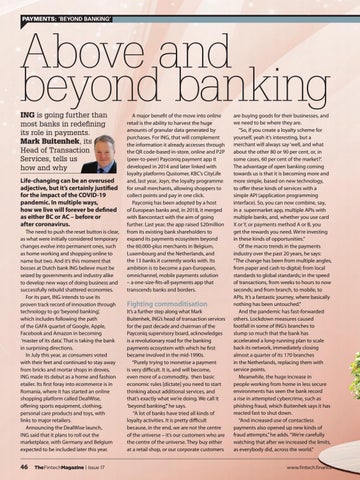PAYMENTS: ‘BEYOND BANKING’
Above and beyond banking ING is going further than most banks in redefining its role in payments. Mark Buitenhek, its Head of Transaction Services, tells us how and why
Life-changing can be an overused adjective, but it’s certainly justified for the impact of the COVID-19 pandemic. In multiple ways, how we live will forever be defined as either BC or AC – before or after coronavirus. The need to push the reset button is clear, as what were initially considered temporary changes evolve into permanent ones, such as home working and shopping online to name but two. And it’s this moment that bosses at Dutch bank ING believe must be seized by governments and industry alike to develop new ways of doing business and successfully rebuild shattered economies. For its part, ING intends to use its proven track record of innovation through technology to go ‘beyond banking’, which includes following the path of the GAFA quartet of Google, Apple, Facebook and Amazon in becoming ‘master of its data’. That is taking the bank in surprising directions. In July this year, as consumers voted with their feet and continued to stay away from bricks and mortar shops in droves, ING made its debut as a home and fashion etailer. Its first foray into ecommerce is in Romania, where it has started an online shopping platform called DealWise, offering sports equipment, clothing, personal care products and toys, with links to major retailers. Announcing the DealWise launch, ING said that it plans to roll out the marketplace, with Germany and Belgium expected to be included later this year.
46
TheFintechMagazine | Issue 17
A major benefit of the move into online retail is the ability to harvest the huge amounts of granular data generated by purchases. For ING, that will complement the information it already accesses through the QR code-based in-store, online and P2P (peer-to-peer) Payconiq payment app it developed in 2014 and later linked with loyalty platforms Qustomer, KBC’s CityLife and, last year, Joyn, the loyalty programme for small merchants, allowing shoppers to collect points and pay in one click. Payconiq has been adopted by a host of European banks and, in 2018, it merged with Bancontact with the aim of going further. Last year, the app raised $20million from its existing bank shareholders to expand its payments ecosystem beyond the 60,000-plus merchants in Belgium, Luxembourg and the Netherlands, and the 13 banks it currently works with. Its ambition is to become a pan-European, omnichannel, mobile payments solution – a one-size-fits-all-payments app that transcends banks and borders.
Fighting commoditisation It’s a further step along what Mark Buitenhek, ING’s head of transaction services for the past decade and chairman of the Payconiq supervisory board, acknowledges is a revolutionary road for the banking payments ecosystem with which he first became involved in the mid-1990s. “Purely trying to monetise a payment is very difficult. It is, and will become, even more of a commodity, then basic economic rules [dictate] you need to start thinking about additional services, and that’s exactly what we’re doing. We call it ‘beyond banking’,” he says. “A lot of banks have tried all kinds of loyalty activities. It is pretty difficult because, in the end, we are not the centre of the universe – it’s our customers who are the centre of the universe. They buy either at a retail shop, or our corporate customers
are buying goods for their businesses, and we need to be where they are. “So, if you create a loyalty scheme for yourself, yeah it’s interesting, but a merchant will always say ‘well, and what about the other 80 or 90 per cent, or, in some cases, 60 per cent of the market?’. The advantage of open banking coming towards us is that it is becoming more and more simple, based on new technology, to offer these kinds of services with a simple API (application programming interface). So, you can now combine, say, in a supermarket app, multiple APIs with multiple banks, and, whether you use card X or Y, or payments method A or B, you get the rewards you need. We’re investing in these kinds of opportunities.” Of the macro trends in the payments industry over the past 20 years, he says: “The change has been from multiple angles, from paper and cash to digital; from local standards to global standards; in the speed of transactions, from weeks to hours to now seconds; and from branch, to mobile, to APIs. It’s a fantastic journey, where basically nothing has been untouched.” And the pandemic has fast-forwarded others. Lockdown measures caused footfall in some of ING’s branches to slump so much that the bank has accelerated a long-running plan to scale back its network, immediately closing almost a quarter of its 170 branches in the Netherlands, replacing them with service points. Meanwhile, the huge increase in people working from home in less secure environments has seen the bank record a rise in attempted cybercrime, such as phishing fraud, which Buitenhek says it has reacted fast to shut down. “And increased use of contactless payments also opened up new kinds of fraud attempts,” he adds. “We’re carefully watching that after we increased the limits, as everybody did, across the world.” www.fintech.finance
